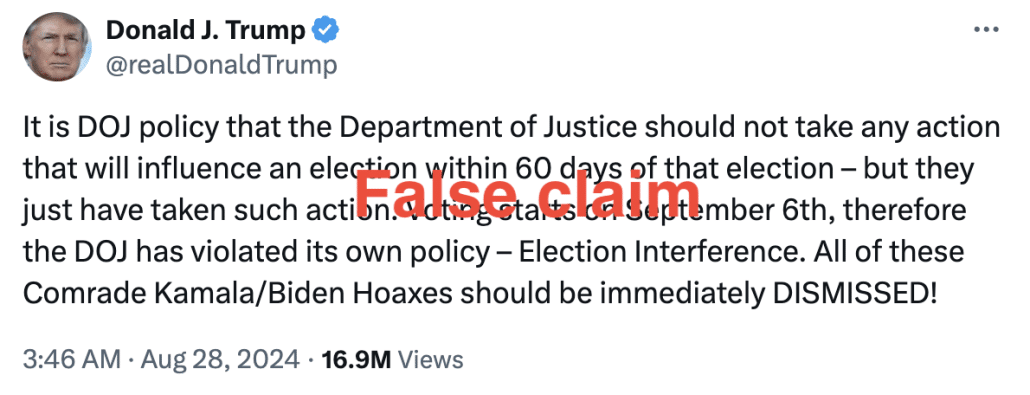As the mainstream press continues to soil itself like toddlers over Kamala Harris’ interview tonight, I was going to use this CNN piece — suggesting questions about how the VP’s stance on immigration has changed — as an example of the complete collapse of any sense of newsworthiness.
After all, Donald Trump has still never been asked, much less answered, how he plans to fulfill his promise of mass deportations, something that might be impossible without dramatic escalation of police force against both citizens and not. He hasn’t been asked how he’ll pay for it, which would be prohibitively expensive. He hasn’t asked who will do the jobs, such as in agriculture, that keep America’s cost of living relatively low. He hasn’t been asked if he’ll separate families, especially marriages empowered by Obergefell.
Trump hasn’t been asked the most basic questions about one of his only policy promises.
CNN’s Eva McKend has really good questions about immigration policy. In another place and time they’d be totally valid questions!
But given the failure by the entire press corps to ask Trump about a policy promise that would serve as — and assuredly is intended to serve as — a bridge to fascism, it is the height of irresponsibility to waste time on the shifts in Harris’ immigration views, because they don’t matter in the face of Trump’s promises to sic cops on American families in pursuit of brown people.
So that was going to be my exemplar of how completely the press corps has lost any sense of proportionality regarding what counts as news.
Then I read this piece from ABC, which makes a big deal out of the fact that in 2003 — 21 years ago!!! — some Kamala Harris campaign fliers said she prosecuted over a hundred cases, when she should have said she was involved in that many.
But during a debate held in the runup to Election Day 2003 on KGO Radio, Harris’ then-opponent, veteran criminal defense attorney Bill Fazio, accused her of misleading voters about her record as a prosecutor and deputy district attorney in California’s Alameda County.
“How many cases have you tried? Can you tell us how many serious felonies you have tried? Can you tell us one?” Fazio asked Harris, according to audio ABC News obtained of the debate, which also included then-current San Francisco District Attorney Terence Hallinan.
“I’ve tried about 50 cases, Mr. Fazio, and it’s about leadership,” Harris responded.
Fazio then pointed out campaign literature where Harris had been claiming a more extensive prosecutorial record.
“Ms. Harris, why does your information, which is still published, say that you tried hundreds of serious felonies? I think that’s misleading. I think that’s disingenuous. I think that shows that you are incapable of leadership and you’re not to be trusted,” Fazio said. “You continue to put out information which says you have tried hundreds of serious felonies.”
[snip]
Asked this week about Harris’ prosecutorial experience before she became district attorney, a spokesperson for Harris’ presidential campaign used slightly different language to describe her record — saying she was “involved in” hundreds of cases.
This is insane!! Having prosecuted 50 felonies is a lot, for an entire career! To make a stink about this 21-year old misstatement would be unbelievable on its face.
But it is just contemptible, given the amount of lies Donald Trump tells about his own crimes that ABC lets go unmentioned.
Just as one example, check out how ABC covered Donald Trump’s August 8 Mar-a-Lago presser. In that presser, Trump seems to have falsely claimed he did oversee a peaceful transfer of power (the only lie NYT called out in its coverage of this presser). He lied about the four people who were killed that day. He lied about his role in sending his mob to the Capitol. He lied about what those mobsters chanting “Hang Mike Pence” were seeking to do. He lied about how Jan6 defendants are being treated. [All emphasis here and elsewhere my own.]
QUESTION: Mr. President, you were – you just said that it was a peaceful transfer of power last time when you left office. You didn’t (inaudible) …
TRUMP: What – what’s your question?
QUESTION: My question is you can’t (inaudible) the last time it was a peaceful transfer of power when you left office?
The second one (ph) …
TRUMP: No, I think the people that – if you look at January 6th, which a lot of people aren’t talking about very much, I think those people were treated very harshly when you compare them to other things that took place in this country where a lot of people were killed. Nobody was killed on January 6th.
But I think that the people of January 6th were treated very unfairly. And they – where – they were there to complain not through me. They were there to complain about an election. And, you know, it’s very interesting. The biggest crowd I’ve ever spoken to, and I said peacefully and patriotically, which nobody wants to say, but I said peacefully and patriotically.
Trump made a misleading crack meant to suggest that Arthur Engoron undervalued Mar-a-Lago.
TRUMP: It’s a hard room because it’s very big, if you don’t …
(LAUGHTER)
… this is worth $18 million.
Trump lied that the prosecutions against him — all of them — are politically motivated. He lied that “they” have weaponized government against him. He lied that the Florida case, in which he was investigated for the same crime as Joe Biden, was weaponized. He falsely claimed that the NY cases are controlled by DOJ.
TRUMP: Because other people have done far bigger things in see a ban [ph] and sure, it’s politically motivated. I think it’s a horrible thing they did. Look, they’ve weaponized government against me. Look at the Florida case. It was a totally weaponized case. All of these cases.
By the way, the New York cases are totally controlled out of the Department of Justice. They sent their top person to the various places. They went to the AG’s office, got that one going. Then he went to the DA’s office, got that one going, ran through it.
No, no, this is all politics, and it’s a disgrace. Never happened in this country. It’s very common that it happens, but not in our country. It happens in banana republics and third-world countries, and that’s what we’re becoming.
Trump claimed he wouldn’t have wanted to put Hillary in jail when, on his orders, DOJ investigated the Clinton Foundation for the entirety of his term and then John Durham tried to trump up conspiracy charges against her (and did bring a frivolous case against her campaign lawyer). Trump also lied about calming, rather than stoking, the “Lock her up” chants at rallies. Trump lied about what files Hillary destroyed after receiving a subpoena (and who destroyed them).
TRUMP: I don’t think it’s appropriate for me to talk about it. I think it’s a tragic story, if you want to know the truth. And I felt that with Hillary Clinton, too. You know, with Hillary Clinton, I could have done things to her that would have made your head spin. I thought it was a very bad thing, take the wife of a President of the United States and put her in jail. And then I see the way they treat me. That’s the way it goes.
But I was very protective of her. Nobody would understand that, but I was. I think my people understand it. They used to say “lock her up, lock her up,” and I’d say “just relax, please.” We won the election. I think it would be very – I think – I think it would have been horrible for our country if I – and we had her between the hammering of all of the files.
And don’t forget, she got a subpoena from the United States Congress, and then after getting the subpoena, she destroyed everything that she was supposed to get. I – I – I could – it – I didn’t think – I thought it was so bad to take her and put her in jail, the wife of a President of the United States. And then when it’s my turn, nobody thinks that way. I thought it was a very terrible thing. And she did a lot of very bad things. I’ll tell you what, she was – she was pretty evil.
But in terms of the country and in terms of unifying the country, bringing it back, to have taken her and to have put her in jail – and I think you know the things as well as I do. They were some pretty bad acts that she did.
Depending on how you count, that’s around twelve lies in one hour-long press conference. They’re proof of Trump’s abuse of the presidency, his refusal to cooperate with an investigation like Joe Biden had, his lifelong habits of fraud, and his assault on democracy.
And these are only the lies about his own (and his eponymous corporation’s) crimes! They don’t include the lies about abortion or gun laws and shootings, other lies about the law he told in that presser.
And yet ABC covered none of those lies, focusing instead on Trump’s false claims about crowd size.
Crowd size.
These aren’t the only lies about justice Trump routinely tells. He routinely lies that he “won” the documents case, that he was declared innocent or that Biden was only not prosecuted because he was too old. They don’t include the lies Trump has told about the Hunter Biden case, the Russian investigation, his actual actions in the Ukraine impeachment. Trump continues to lie about whether he sexually assaulted E Jean Carroll. He lies about his Administration’s jailing of Michael Cohen to shut him up.
Then there are Trump’s renewed false claims, in the last day, about the superseding indictment against him.
Trump lies all the time. He lies about the cases against him, about his own crime. He lies with a goal: to present rule of law as a personal grievance. Those lies go to his core unfitness to be President.
And yet, aside from some good reporting (particularly from Katherine Faulders) on these crimes, ABC never bothers to fact check Donald Trump’s lies about rule of law, not even his own prosecutions.
It is the height of irresponsibility to adopt this double standard — to ignore Trump’s corruption of rule of law while chasing a campaign exaggeration made two decades ago. It was bad enough that the press corps sits there, docilely, as Trump corrupts rule of law every time he opens his mouth. But to then try to make a campaign issue about whether Kamala Harris was involved in or prosecuted 50 cases decades ago?
ABC claims that Kamala Harris made misstatements. But their own failure to report on Trump’s false claims is a far, far greater misrepresentation of the truth, and it’s a misrepresentation of the truth they repeat every day.




